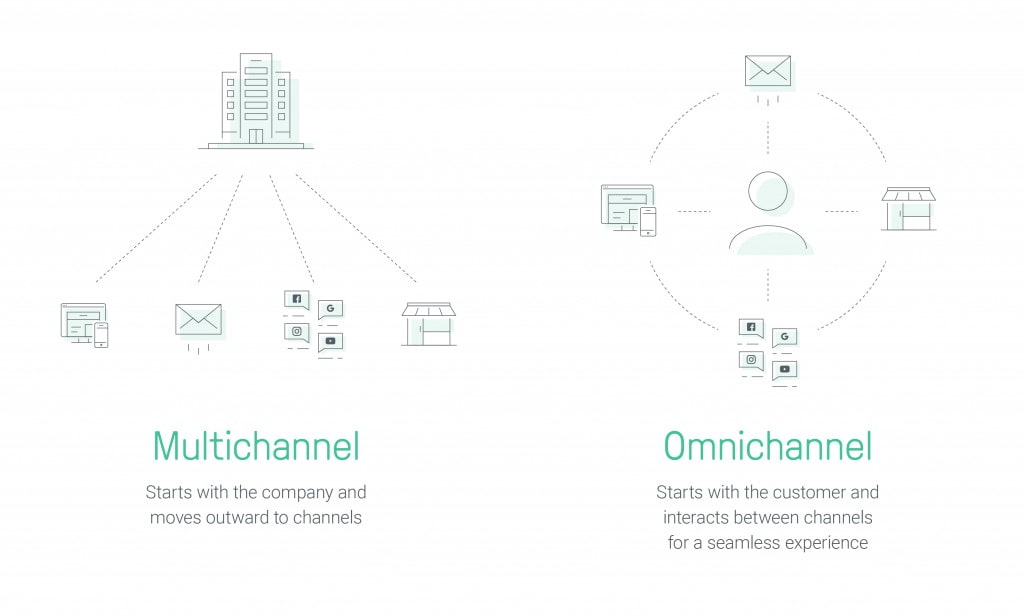Marketing is changing way too quickly. A few years back, the concept of personalized marketing was nothing more than a dream. Today, it is hard to separate both. Marketing without personalization seems a thing of the past. Consumers don’t like mass marketing either. As much as 74% of consumers get frustrated when the website content isn’t personalized and 71% of consumers feel frustrated when the shopping experience isn’t personalized.
Omnichannel marketing is a step towards personalization marketing and UX across all touchpoints and marketing channels. It improves personalization. Your customers receive the same experience and this is what consumers love. Over 80% of consumers are more likely to buy from brands that offer a personalized experience.
You can’t ignore omnichannel marketing if you want to make your target audience and customers happy.
What is Omnichannel Marketing?
Omnichannel marketing is a marketing strategy that is focused on providing a seamless personalized experience to the customers across all touchpoints. The marketing message a potential customer receives has to be consistent and personalized irrespective of the marketing channel used:
It is independent of the channel a potential customer is using. The idea is to provide your customers with the same personalized message that is relevant to the customer behavior, stage in the marketing funnel, and past interactions. The experience should be a continuation and related to the last interaction with your brand.
A retargeting ad is a perfect example of omnichannel marketing in action. A customer visits your website and leaves without buying. You connect with the customer on some other marketing channel and remind him of the last interaction with your website:
The retargeted ad is a continuation of the previous interaction of the customer with your brand. The ad is personalized and this is what omnichannel is all about: Making every interaction with the customer personalized and relevant to that customer only irrespective of the channel he/she is using.
Omnichannel Marketing Vs. Multichannel Marketing
It is often confused with multichannel marketing, and the terms are used interchangeably. However, these two are different.
Multichannel marketing refers to having a unified message on all the marketing channels. You have to be where your customers are. For example, you need to have a website, a YouTube channel, social media accounts, PPC campaigns, and other marketing channels to connect with your target audience. The marketing message across all these channels is relevant to your brand.
In the case of omnichannel marketing, the message on all the channels (multichannel marketing) has to be relevant and personalized based on the customer. The message, in this case, is relevant to each customer:

Omnichannel marketing is all about personalization. And this is what makes it different from multichannel marketing. Yes, both are connected. When you are doing omnichannel marketing, you are already doing multichannel marketing.
The key differences between the two are:
- Channel vs. customer approach: Multichannel marketing focuses on channels whereas omnichannel focuses on customers.
- Engagement vs. consistency: Multichannel marketing focuses on engagement on as many channels as possible while omnichannel focuses on delivering a consistent and relevant experience to each customer on all the channels.
- Effort vs. effortless: The whole purpose of omnichannel marketing is to make customer experience and buying experience as effortless as possible. Multilevel marketing don’t give such a high importance to effortless buying experience.
Omnichannel Marketing Benefits
As consumers demand personalization and consistent experience whenever they contact a brand, the need for omnichannel marketing is growing rapidly. But is it worth the time and effort? Should you really think of investing in an omnichannel marketing strategy?
Well, there are the key benefits:
1. Increase in Revenue
The key benefit is none other than an increase in revenue. According to a study, the purchase rate is 287% higher for campaigns that use three or more channels than campaigns with a single channel:
It isn’t, however, all about the channels you use rather it is more about personalization. Research shows that 91% of consumers are more likely to buy from a brand that provides relevant offers and products. This makes sense too.
With omnichannel marketing, the interaction remains consistent and relevant. Every time a potential buyer connects with your company, the experience begins from the exact place where it was left. This improves the chances of conversion irrespective of the channel used.
2. Increase Customer Loyalty
What does consistent, relevant, and personalized UX do?
It improves customer loyalty.
Businesses that use omnichannel marketing strategy see as much as 91% year-over-year customer retention rate as compared to their counterparts. The customer retention rate of such companies is 89% while companies that don’t use omnichannel marketing have a 33% customer retention rate:
Customer retention is a huge problem for businesses of all types. And the core reason is that businesses don’t focus on existing customers as they should. Switching to omnichannel marketing will solve the problem as it makes it easier to keep your customers hooked with a consistent experience.
3. Brand Awareness and Recall
It improves brand awareness and brand recall. When customers see a consistent message on each touchpoint, it gets easier for them to remember your brand and the experience they have with it.
And when your target audience and customer see your brand on all the channels, it improves brand recall as they’re more likely to remember and recall your brand.
Final Words
If I have to summarize in a single line what is omnichannel marketing, I’d call it: The future of marketing. And it is already here.
Look around and you’ll see a lot of big and small businesses efficiently using omnichannel marketing strategies such as Starbucks, Bank of America, Disney, Walgreens, Virgin Atlantic, and others. It doesn’t matter how big or small your business and audience are, you can always create and implement an omnichannel marketing strategy.
All it requires is the right mindset and culture in your organization. The marketing tool you are using will handle and manage everything. It relies on data and marketing automation. And this is what you are already doing, right?
Featured Image: Pexels






